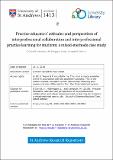Files in this item
Practice educators’ attitudes and perspectives of interprofessional collaboration and interprofessional practice learning for students : a mixed-methods case study
Item metadata
| dc.contributor.author | O'Carroll, Veronica | |
| dc.contributor.author | McSwiggan, Linda | |
| dc.contributor.author | Campbell, Martin | |
| dc.date.accessioned | 2019-11-29T00:37:10Z | |
| dc.date.available | 2019-11-29T00:37:10Z | |
| dc.date.issued | 2019-09-03 | |
| dc.identifier | 256782284 | |
| dc.identifier | 44800474-ed54-43e8-9fba-b274f33874dd | |
| dc.identifier | 85057580239 | |
| dc.identifier | 000487940900003 | |
| dc.identifier.citation | O'Carroll , V , McSwiggan , L & Campbell , M 2019 , ' Practice educators’ attitudes and perspectives of interprofessional collaboration and interprofessional practice learning for students : a mixed-methods case study ' , Journal of Interprofessional Care , vol. 33 , no. 5 , pp. 414-423 . https://doi.org/10.1080/13561820.2018.1551865 | en |
| dc.identifier.issn | 1356-1820 | |
| dc.identifier.other | ORCID: /0000-0001-5777-104X/work/61370257 | |
| dc.identifier.uri | https://hdl.handle.net/10023/19023 | |
| dc.description.abstract | Interprofessional collaboration (IPC) is important for the delivery of effective integrated health and social care systems. Interprofessional practice learning (IPPL) enables students to learn to work together within a relevant context and prepare for future IPC. While there is some evidence that negative attitudes impact on IPC and interprofessional education, there is a dearth of research on health and social work professionals’ attitudes and perspectives of IPC and IPPL opportunities for students. A mixed-methods case study was used to investigate practice educators’ attitudes and perspectives of IPC and IPPL for their students. Results showed that attitudes were positive and that mainly meso- and macro-level factors, as opposed to the micro level, impacted on the implementation of IPC and IPPL for students’ learning in practice settings. IPC was perceived to be best enabled by effective communication, established teams, IPPL for staff, and shared processes and policies. Close working proximity to other professionals encouraged informal communication and positive interprofessional relationships. Motivation and resources were perceived as enablers of IPPL, but there were often missed opportunities for IPPL. These findings suggest that further work is required to identify systems for improving IPC and to enhance IPPL opportunities for students learning within practice settings. | |
| dc.format.extent | 932899 | |
| dc.language.iso | eng | |
| dc.relation.ispartof | Journal of Interprofessional Care | en |
| dc.subject | Case study | en |
| dc.subject | Mixed methods | en |
| dc.subject | Interprofessional collaboration | en |
| dc.subject | Interprofessional practice learning | en |
| dc.subject | Health and social care | en |
| dc.subject | Practice educators | en |
| dc.subject | LB2300 Higher Education | en |
| dc.subject | RA Public aspects of medicine | en |
| dc.subject | NDAS | en |
| dc.subject.lcc | LB2300 | en |
| dc.subject.lcc | RA | en |
| dc.title | Practice educators’ attitudes and perspectives of interprofessional collaboration and interprofessional practice learning for students : a mixed-methods case study | en |
| dc.type | Journal article | en |
| dc.contributor.institution | University of St Andrews. School of Medicine | en |
| dc.contributor.institution | University of St Andrews. Office of the Principal | en |
| dc.contributor.institution | University of St Andrews. School of Psychology and Neuroscience | en |
| dc.contributor.institution | University of St Andrews. Education Division | en |
| dc.identifier.doi | 10.1080/13561820.2018.1551865 | |
| dc.description.status | Peer reviewed | en |
| dc.date.embargoedUntil | 2019-11-29 |
This item appears in the following Collection(s)
Items in the St Andrews Research Repository are protected by copyright, with all rights reserved, unless otherwise indicated.

